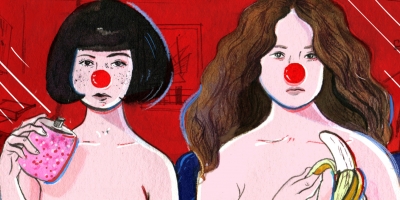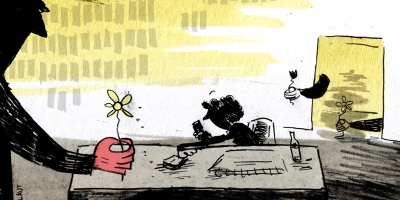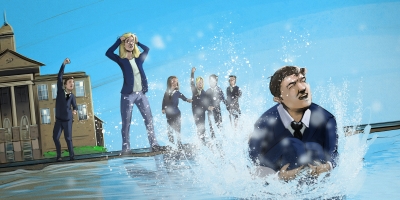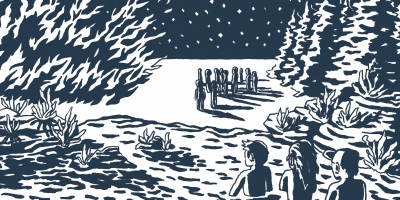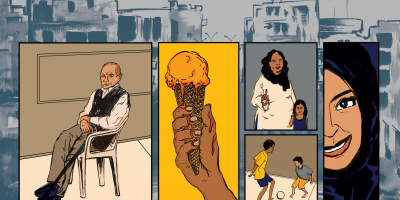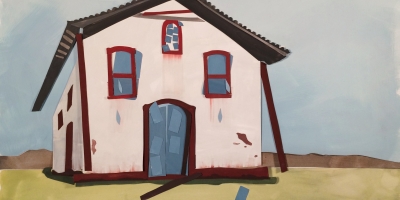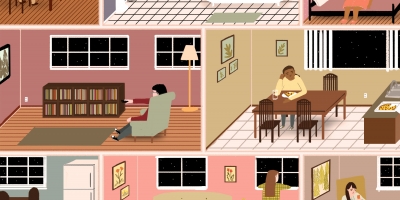Fiction
Greyhound
by Steve Wilson

The man that you were when you left San Francisco thinks the pregnant teen won’t join the party, but already there’s a new you settling in, and you’re surprised to feel a kind of dark excitement as she wraps her fingers around the neck of the bottle of Jack Daniels and takes a deep swig. The bus is cool, the windows dark. You’ve only just settled into motion, clearing the delta and heading out into the valley, but already this space is separate, subject to its own laws.
The girl is seated across the aisle, leaned back comfortably against her chair. She’s lanky as a mantis, her eyebrows pale as duckling down. Blue veins snake beneath her skin where laugh lines should be. But her face is full and her belly rises like a hummock from the swamp. She wipes her mouth and sighs with innocent contentment, smacking her tongue against the roof of her mouth, and this seems like a kind of possibility. Because freedom is a pregnant woman drinking. Anything is permitted.
She offers the bottle to your neighbor, who takes it back with an appreciative nod. “That’s how you do it,” he almost whispers. He nudges you with his elbow and makes a low whistle.
Outside, the light of day has been replaced by the lifeless fluorescence of highway exits, Taco Bells and Motel 6s like a kind of déjà vu. Your tongue burns from the whiskey. Borders are losing their edges.
“What takes you to Salt Lake?” you ask the girl.
“Headed home,” she says, looking down at her belly.
“Good to go home,” you say.
She shrugs. “Thought I’d escaped, but—” She laughs a private laugh. Her face flushes with the liquor.
“How about you?” she asks.
“Business,” you say.
“Everything’s business,” says your neighbor, tucking the whiskey back into a paper bag on the floor in front of him. He slides down the window and lights an unfiltered Lucky Strike, puffing out of the side of his mouth. He’s got spare salt-and-pepper stubble and dyed black hair and skin like an aged cheese.
“Whatcha think?” he says, sliding a cigarette out of the pack toward you. There’s a No Smoking sign on the glass not half a foot from his face, but you take it anyway, even though it’s been years. He offers one to the girl, but she waves it off, pointing to her stomach.
He shrugs, leaning in to give you a light. You draw in the smoke and your head goes light, the nicotine hitting right away. The rush in your blood feels like being young, but the smoke feels like steel wool, and you’re doubled over coughing when the bus driver gets on the intercom: “You two smoke again and I’ll put you out on the side of the road—and nobody will give me a hard time about it either.”
You think about swallowing the cigarette to hide the evidence. But your neighbor makes the international sign for jerking off and throws his cigarette out the window, so you do the same. You both snicker like high schoolers. He claps you on the back, and it’s like he’s your best friend in the world.
A little while later, the bottle’s going around again and he’s telling you and the girl about his ex-wife. “Like matches and kerosene falling in love,” he says. “No good for anybody.” One time they were blitzed and stole a hearse just for laughs and made it all of three blocks before they realized there was a body in the back. Damn thing was so fresh it was letting out its last wind, something half way between a moan and a sigh of relief. “Thing was,” he continues, “when we took the hearse it was parked in front of one of those adult theaters with the peepshows you can see for a quarter a pop. Never figured a guy would leave a dead body like that just to go play with himself. Meter hadn’t even been paid—didn’t let a quarter go to waste!”
You’re laughing and then you’re coughing, and he’s clapping you on the back. The bouncing, sleeping heads of the passengers up front pop up to look back in annoyance, like prairie dogs reconnoitering. Their noses in the air, sniffing around with the authority of the wounded, make you all explode with laughter all over again.
When you first woke up this morning, you didn’t remember who you were. Your newly constructed apartment was whitewashed of any particulars. You drifted in its blankness, its acceptance of all potentialities. The sunlight cast a sharp trapezoid on the smooth, white carpet. When the sensation of forgetting faded, you felt the twinge of being set back in shape, the muscles of your back and jaw tightening.
You rose and went for a run by the water, the shock of your weight against concrete vibrating in your hipbones. The tide was high. The bay lapped at its borders. Your body breathed while the growing light turned the dark, indifferent waters light and hollow.
At work, you sat in your office and watched fat clouds drift over the bay, shadows large as city blocks traveling over the water. The scale of all that space made you feel something like nostalgia, something like grief. How large the world is. How far out of reach. You drifted away from yourself into the space beyond the glass, the silent vortices of air, the ragged white caps of the waves. The person in this room made a mistake somewhere, but you’re not sure how to unwind it. You’re like the discarded carapace of some living thing that has flown off, leaving you to wonder why you’ve got all the pieces but you cannot move.
The pills come out in Reno. Tiny red capsules in a Ziploc bag your neighbor pulls out of his pocket. He drops four in your palm and wanders off to take a leak. You stand in the cold at midnight, washing two down with more Jack Daniels. The girl digs in your palm, picking up a capsule. She holds it in front of her face, inspecting it, taps it against her lips. The neighbor’s cough echoes from the alley. She frowns and places it back in your palm.
“How long you got?” you ask, waving at her belly.
“Life,” she says. “Life without parole.” You laugh, but she doesn’t join you.
She’s standing in her short sleeves, though it’s cold enough to see her breath. When you ask her if she’s warm enough, she doesn’t answer. Her teeth gleam in the orange light of the streetlamp, and the reflected light is brittle.
She places her palm against the arc of her belly and tells you it’s a girl, smiling suddenly and without reservation, as overtaken by it.
“I wasn’t going to find out,” she says. “My mom said it should be a surprise. But I think we already got the surprise part covered.” The smile becomes work, and it drops slowly, as if her cheeks can’t hold the weight. She tells you that, at first, she didn’t want to know anything, that even as she began to show and her stomach became curved and unfamiliar, she was fascinated with the changes in her own body, but not with anything that came after. She wanted to pretend that the pregnancy was all there was, that the change would be contained within her body, and one day the change would end. But eventually, she felt like she needed to get ready, to prepare herself for the particulars, and that’s when she went down to find out if it was a boy or a girl, and she called her mother and told her she was going to come home.
“I knew she was a girl, though,” she says, stubbing the ground with her toe. “I knew the whole time. I just didn’t like to think about it, because that would make her more like me.” She looks at the ground, letting her hair hang over her face. “That’s the thing that bugs me most about going home. That I’m taking her with me. I feel like I’m crash landing with a passenger on board.”
She starts to lift the bottle to her lips, and again you feel a perverse excitement, like looking out over land burned to charred flatness, open and waiting. “I know I shouldn’t drink,” she says. “But it makes it feel like something can still happen.”
That’s when you tell her about your dog. For months, you’ve been putting up signs about your lost dog, all around your neighborhood and several more neighborhoods besides. People call with leads and you talk to them about what they saw. But you don’t have a dog. Or you haven’t for a long time. The picture on the sign is of a dog you had when you were a kid. It ran away and you never saw it again.
The whole thing’s an inside joke with your sister, who died last year, which is the worst kind of inside joke. The two of you used to play with the dog in the small wood at the end of your block, the dog nosing his way into the cracks of the granite outcroppings. He’d send squirrels packing. You’d chase them pointlessly with your sticks. Your sister was five years older, tall, her face sharp with experience while you were still soft with baby fat. In late autumn, the sky was white and flat, the two of you red-nosed, wiping snot with the backs of your hands. The dog was the only warm thing among you. Your parents left the two of you for afternoons that were long enough to make you feel alone and subject to your own, invented rules. You’d pack yourselves into one of the granite overhangs. The dog’s breath would steam as he lay against you, keeping you warm. The dry leaves smelled like smoke.
When the two of you were grown, your sister would recall the way you looked for the dog after he ran away. Everywhere you went, watching with a little kid’s need and optimism. You’d pick out anything that even resembled a dog: Is that him? Is that? Like he was a master of disguise. The two of you laughed, remembering it, and it turned into a game between you. Pointing at anything from terriers to Great Danes—is that him? What about that? It was funny, but one time last year your sister was drunk, and she was talking about some new plan she had to try to straighten herself out, and not believing it. “Maybe if you’d found that dog …” she said, but didn’t finish the thought, her eyes suddenly flat, like she’d figured out that sometimes you’re set down a path and there’s no way to turn back. You tell the girl that people call all the time with leads, and sometimes you check them out. You go to the places they tell you. You wait to see if he shows up.
You tell her how today you forgot to stop the answering machine after listening to one of the tips, and the single message you had saved from your sister was suddenly playing in the room. How her voice was thin, not like you remembered, and it shocked you because both the recording and your memory were wrong—neither had preserved her. The space of that forgetting filled your apartment. Your neighbors were playing dance music, the bass thudding through the walls like someone trying to get in, like the police at the door, needing to respond to some emergency that you caused or are unable to handle. You tell her that the pounding filled you with relief.
Not long afterward, you’re all on board with your noses pressed against the glass, and you’re watching the yellow lane lines glowing in the headlights. With the pills, your head is larger than it was, and more can fit inside it, and that makes everything louder and quieter at the same time, as close as your own self but somehow out of reach. Beyond the headlights, the grey moonscape of the Nevada desert recedes into blackness. Your neighbor is laughing, his face red and heedless. The pregnant girl has her head pressed between you, her smile the living ghost of some version of herself, probably no more than a few months old, that was still young and could feel happiness mixed with nothing else. You’re laughing too, but when you crane your neck up, there are so many stars your stomach turns with the fear of the space between them.
You start to tell them about the lake. How back in the Pleistocene it was the great Lake Bonneville, 32,000 square miles of surface and 1000 feet deep—covered half of Utah and parts of Nevada and Idaho besides. Back when there were wooly mammoths and saber-toothed tigers and Neanderthals in pelts hunting in the never-ending cold. God knows what was at the base of it. How the whole damn thing was held in by a mountain pass that gave way under the impossible weight of all that water. How a wall of water four hundred feet high carved the earth like a plow, and left behind this inland sea where water comes but never leaves except by turning to vapor. How the salt left behind is so thick it burns. How sometimes you picture yourself riding the crest of that flood, hanging on to its edge till it swallows you up whole, like the great tide of history obliterating your solitary life, carrying you to—
“Sir, you need to keep it down for the folks trying to rest.” The scolding basset hound eyes of the bus driver are watching you in the darkened windshield.
The neighbor jerks off and rolls his eyes. “Someone’s got detention,” he says.
“I like that,” the girl says, referring to your monologue. “Back then nobody was tied down to anything. Nobody had a home to go home to.”
“How’s that a good thing?” says the neighbor. She shrugs as a tractor-trailer comes the other way on the highway, its headlights filling the bus with a total and painful light.
You arrive at the lake at dawn. The mirrored surface of the water spreads to the horizon, purple and black, as the bus slides past scarified salt flats and blanched rock piles on its way to the city. Your neighbor disappeared to the bathroom some time ago, and you’ve taken his place, resting your head against the cool glass. The sight of all that water seems to dampen sound. You feel suddenly attuned; the bones of your skull vibrate at attention. You sit, cocooned, the bus between you and all that sky.
Something clangs ominously, and the bus comes slowly to a halt, billowing smoke from the engine. The driver disappears to the back of the bus, and then calls dispatch. His protests grow louder, but give way to a sigh, and after a minute, he orders you all off. The three of you disembark, the wind picking up as you step off the last step, the land so flat there’s nothing to hold you in. You smile at the groggy nine-to-fivers, who huddle and complain in the early light. You count three who give you the finger.
“Got a reprieve,” the girl says.
“Let’s smoke,” says your neighbor. You follow him to a cluster of boulders near the water, where his matches gutter in the wind, the two of you with your hands cupped around his, your knees all touching.
After the confines of the bus, the room of the sky is overwhelming, and you feel yourself diffusing in all that space. You tell them that you can’t imagine how you’d pack yourself back inside, and the girl motions to the bus and says you should burn it, that no one deserves to go anywhere that bus would take them. You all laugh, but her face is strained with want. She chews on the ends of her fingers, her knees bouncing as she looks out over the length of the water. Her body leans forward as if she were long shipwrecked, the act of waiting worn into her frame, watching for a ship to signal her rescue from the unreliable distance. She kicks off her shoes and digs her feet into the sand. The black surface of the lake is a gaping hole, and your muscles tense with the desire to grab her hand and jump, to feel the nauseating flush of heat and emptiness as you pause in mid-air before falling, the space below you endlessly yielding.
In the end, it’s easier than you’d expect: just lit matches and cracked windows and no one around to stop you. The bus is empty, the bus driver distracted by passengers complaining in the dark. You lean up on your tiptoes against the side of the bus and watch, listening to the clicks and rattles of the bus settling. The wind has quieted, and the stillness makes time expand. At first, there’s nothing. Then there’s the warm flicker of one spot catching, then another. When the shadows in the bus start to dance, you walk back through the rocks to where your friends are waiting. You take off your shoes and then your socks, and by the time you’re back to the others you’re naked down to your boxers.
“Who’s going in?” you say, and soon they’re tripping along behind you, the girl down to her underwear, the neighbor stumbling over the jeans around his legs. He’s all pale white limbs and dirty briefs. Her face is flush and bright. As you approach the water, the smell of sulfur and the thick cloud of brine flies should make you retch, but it seems like something ancient returning, and you’re filled with a sudden lightness. The three of you wade out on the shallow grade, a hundred yards to where the water hits your chest, and you float on the saturated waters, watching the shore. When you first lie back, the cold water makes your breath quick and ragged. The burn of salt against the skin feels like being sheared clean, down to the powdery, unblemished freshness of a newborn.
By then, your friends have noticed the flames. “You did it,” the girl says, not quite believing, and laughs, clapping her hand over her mouth. The neighbor shakes his head and lies back in the water, limbs spread like a starfish, his pale skin wavering under the glassy surface. He lets out a long slow whistle and starts to paddle away from shore.
The bus burns patiently, in stages, an orange flame growing in its belly, then purple and black spreading along its outline. Around it, the other passengers point and shout or stand silent and unmoving, petrified as the bones in the rock beneath you. The fire colors their faces. One man runs for the luggage compartment to grab whatever he has below, but he’s held back by the driver and another, taller man you don’t remember seeing before. His shouts carry across the water.
You nod out toward the neighbor and lie back, the girl following. Your hands move through water, pushing you outward. The feel of it slips through your fingers. Overhead, a flock of birds flies, following the path wound from birth into their hollow bones.
When the fire reaches the gas tank, a thundering whomp carries across the surface of the water. The two of you stop and watch as a wall of flame rises into the brightening sky. The heat of it covers your face. The passengers hide behind brush and rocks, yelling. Their faces are twisted with awe. They are skinned down to nothing, holy as anything reborn. A few look at the water, eyes sweeping across the endlessness of the lake, and it is as if the fear is not of burning but of being left here, held in the mouth of this place, cut off from all hope of home.
You float in the smooth blackness of the lake as the bus burns with a new intensity, orange-purple flames reaching out across the surface, matching the colors of the breaking dawn. The light of the fire floats on the girl’s eyes. Her belly rises next to you like a desert island. You tell her that the water is filled with tiny brine shrimp, and she asks, if it came down to it, if you could open your mouth and feast like a whale, filtering. You tell her it seems like the most natural thing in the world.
Behind you, the neighbor has moved far out from shore. His hands rise together and fall back into the lake as he strokes. He splashes and spouts water from his mouth. You start to lean back to follow, but the girl yelps and grabs your hand. “She’s kicking,” she says, placing your palm against her stomach. “I can feel her.” Her eyes are full of surprise and terror and joy, and for the first time you hear the sirens. Faint and far away, at first they are just the suggestion of something to come, a reminder of a dim and forgotten truth: that the work of the world is to shape all things from formlessness, to mold them into the container of who they are. The girl has your hand pressed against her. You can feel every quiver of motion transmitted along her belly. Eyes wide, barely breathing, she’s so quiet the space inside her has become vast and silent and still, a sanctuary of expectation.
The sound of the sirens grows, and it no longer seems outside you. It is the yawning scream of space collapsing, the possible decaying to the real. It breaches the shell that separates you from the world, and your body seems suddenly fragile, sensitive and awake. Your ears fill with the roar and crack of the fire. Your heart kicks in your chest. Red and blue lights flash on the road, approaching, pulling behind them the dark event horizon beyond which all potentials disappear. The girl smiles and waits, the edges of her eyes pulled back in giddiness and worry.
You feel the need to drift again into the space of your surroundings, but the ends of your nerves are raw and receptive. The smell of smoke is close. And it works a kind of limiting magic, drawing you into yourself, drawing me suddenly here to this place.
“Wait for it,” she says, her eyes pale and expectant and uncertain. “Wait till you feel it.”
The sirens rise from shore. Smoke darkens the sky like ink in water. She holds my hand against the warmth of her belly. We press the edges of ourselves against the next unfolding moment. I stand under a sky that has no need to remember or forget, because it is time itself. The water recedes in every direction, mirroring the sky. Its edges spill from the ends of the earth. I quiet my heart, my breath. And I wait. To feel it, when it comes—when it announces its arrival, the tiny, red-blooded thing, waiting there in the deep red blackness.
